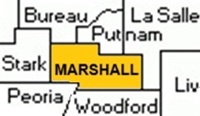
 L. P. Bates of Sparland, communicates the following sketch of Franklin W.
Graves, to the Lacon Journal, who owned and occupied the ground upon which
Sparland now stands 37 years ago; also of F. M. Bates. Both will be interesting
to many of our old settlers who knew them in their day:
L. P. Bates of Sparland, communicates the following sketch of Franklin W.
Graves, to the Lacon Journal, who owned and occupied the ground upon which
Sparland now stands 37 years ago; also of F. M. Bates. Both will be interesting
to many of our old settlers who knew them in their day:
Franklin Ward
Graves settled in what is now Sparland, in 1830. He was from Indiana, and came
here because he thought it was a great wheat country. Mr. Graves and family
lived here 16 years, and then started for California; because, as he believed,
that was the best wheat country. Probably he thought he was going to a wheat
country, but probably the frontiersman's life best suited his restless nature,
and when his monopoly of the spontaneous production of the country was about to
be disputed, he found this a poor wheat country. But hard was the fate of that
ones happy family. Losing the way in attempting to find a nearer one, and
overtaken by an early winter, among the Rocky mountains, several of the family,
and many of the company perished of cold and hunger. So desperate was their
condition that everything that could sustain life a moment was made use of, and
even the horrid feast of human flesh was freely indulged. Whether any were
sacrificed for the purpose, or whether the already dead sufficed, has always
been in doubt, but the meat probably theory is, "That lots were cast, and the
orgies of cannibalism consummated. Mr. Graves, Mrs. Graves, and a son-in-law and
two children perished, the next after suffering more than death, obtained
assistance from California and escaped. Mr. Graves and family were a true type
of western early settlers. When they came here, and for two years after, the
present town site of Sparland below the railroad, was the corn field of the
Indians. They were on good terms with the natives, and after the Indians left
any stranger or neighbor was always hospitably entertained. Their cabin stood
very near where Mr. Cotton now lives, and one room was at once parlor, bedroom,
kitchen, and to a considerable extent a grain warehouse. But there they lived
from 1830 to 1846 and no healthier, happier, kinder family ever lived than they.
In 1845 Mr. Graves sold near 500 acres for $1500, and whilst the trade was
pending, he told the writer in confidence, that he was bound to sell if he only
got congress price. But this was a fair price at that time. Another case of
cheap land occurred with Richard Scholes of La Prairie township, about that
time, or rather later. A gentleman from the east owning a beautiful quarter,
came to look at the country; a winter storm came on, and being weather-bound, he
pored over Mr. Scholes' library and offered Mr. Scholes the rare bargain of a
splendid quarter of land for $100, and he would take a copy of Storms's works,
which he had been reading, for a first payment, the balance on long time. The
first could live without work. Game was plenty, deer and turkeys were numerous,
honey in the woods was easy found, and of simple frugal habits, no over-taxing
of the energies was required. But when enterprise took the load, struggles
commenced and in the unaided contest with nature many a strong frame has been
brought down. As an instance of the pioneer life, I will give a little history.
F. M. Bates came to Illinois in 1887,
and possessing all the qualifications of a first class wrestler with nature, he
went to work to make a farm. His claim of 160 acres must be fenced and plowed.
He built a hut six feet by ten, door, chimney and window. He built in a ravine,
100 feet below the level, kept "bach" all winter, made rails, cut hard logs,
carried his grub six miles on his shoulder, and in that long cold winter worked
every day, and scarcely ever saw a human being, except on his visits to the
settlement. Have men deteriorated, or where is the young man now that with a
good education excellent business qualifications, that will shoulder his axe and
with that alone carve out a fortune and a name?
Source: Marshall County Republican, Henry, Ill., 21 Nov 1867, page 1.
Contributed 2021 Oct 10 by Elizabeth Lachemann lzbth.will@gmail.com
| Bureau Putnam La Salle | |||
| Stark |
 |
||
| Peoria | Woodford | ||

